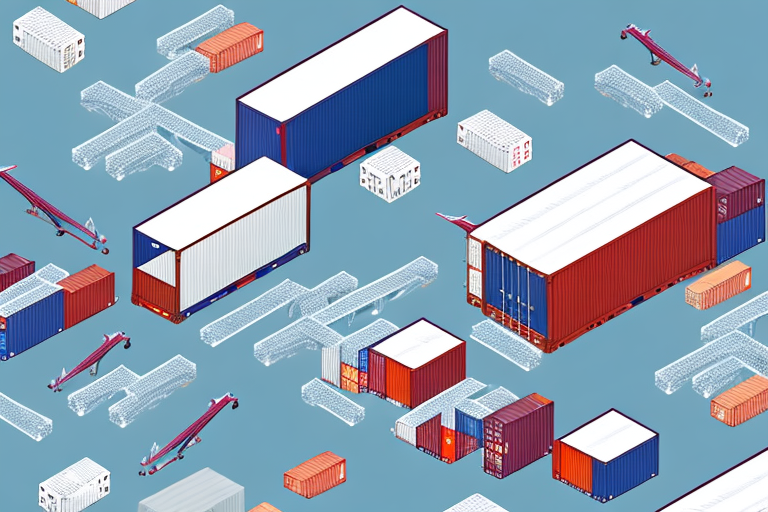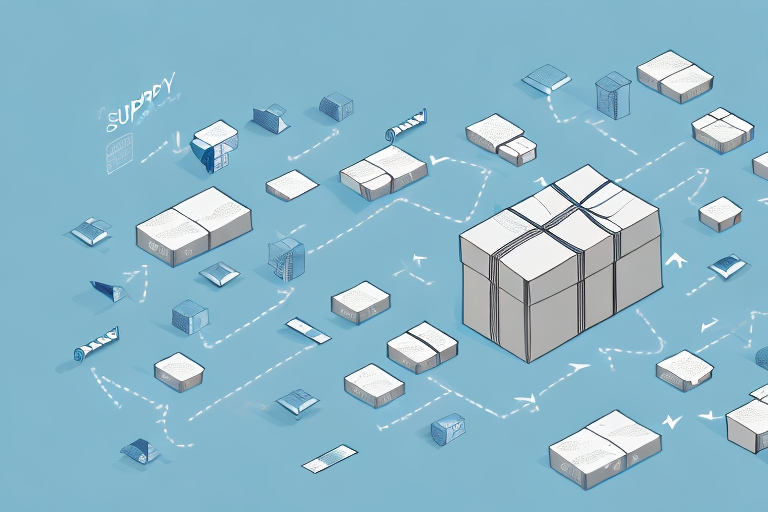Optimizing Your Supply Chain with a Container Freight Station (CFS)
If you're looking to improve your supply chain operations, one solution to consider is the use of a Container Freight Station (CFS). In this article, we'll delve into what a CFS is, the benefits it offers your business, and how to choose the right one for your needs. We'll also explore best practices for using a CFS and its impact on inventory management and your bottom line. Finally, we'll look into the future of CFSs and showcase real-life success stories from companies that have implemented this strategy into their supply chains.
Understanding the Role of a Container Freight Station (CFS) in Your Supply Chain
A CFS is a facility where goods are consolidated and deconsolidated for shipping purposes. It acts as a central hub for cargo management, where goods are stored, sorted, and prepared for transportation. Essentially, a CFS is a location where freight shipments are combined into containers before being shipped to their respective destinations.
Additionally, CFSs often offer value-added services such as customs clearance, cargo insurance, and documentation preparation. These services streamline the shipping process and ensure that goods are delivered on time and in compliance with regulations. CFSs are particularly beneficial for businesses that need to transport large volumes of goods or have complex supply chains involving multiple transportation modes. By utilizing a CFS, businesses can reduce transportation costs, improve supply chain visibility, and enhance overall efficiency.
According to a report by ShipScience, companies that implement CFS solutions can see a reduction in shipping costs by up to 15%.
The Benefits of Using a Container Freight Station (CFS) for Your Business
The primary advantage of using a CFS is convenience. It serves as a one-stop shop for all your cargo logistics needs. Utilizing a CFS can help reduce costs, streamline operations, and improve overall supply chain efficiency. Additionally, a CFS can minimize the time and resources required for loading and unloading cargo, helping you avoid potential delays at ports.
Another significant benefit is the enhanced security provided by CFS facilities. Equipped with advanced security measures such as surveillance cameras, security personnel, and access control systems, CFSs ensure that your goods are protected from theft, damage, and other security risks. Moreover, CFS facilities are often strategically located in secure areas, further safeguarding your cargo.
- Cost Reduction
- Streamlined Operations
- Improved Supply Chain Efficiency
- Enhanced Cargo Security
How a Container Freight Station (CFS) Helps Improve Your Logistics Operations
Integrating a CFS into your supply chain can significantly enhance your logistics operations. A CFS provides better control over the movement and delivery of goods, allowing your business to manage inventory more effectively and reduce storage costs by consolidating goods. Faster loading and unloading times facilitated by a CFS increase operational efficiency and minimize the risk of cargo damage.
Furthermore, CFSs offer additional services such as customs clearance, cargo insurance, and documentation assistance. These services streamline the logistics process, saving your business time and money by reducing the need for multiple vendors. Secure storage options for high-value or sensitive goods are also available, ensuring protection during transit and storage.
The Different Types of Container Freight Stations (CFS) and Their Uses
There are several types of CFSs, each tailored to specific needs:
- Perishable Goods CFS: Specialized in handling temperature-sensitive items such as food and pharmaceuticals.
- Bulky or Oversized Cargo CFS: Designed to accommodate large or heavy items that require special handling.
- Bonded Warehouse CFS: A secure facility that allows storage of goods without paying customs duties or taxes, ideal for businesses that import goods and need temporary storage before customs clearance.
- Value-Added Services CFS: Offers additional services like packaging, labeling, and assembly, beneficial for businesses requiring more than basic storage and handling.
Key Factors to Consider When Choosing a Container Freight Station (CFS)
Choosing the right CFS involves evaluating several key factors:
- Equipment and Capabilities: Ensure the CFS has the necessary equipment to handle your type of cargo.
- Location: The CFS should be strategically located close to your transportation network to minimize transit times.
- Reliability and Reputation: Research the CFS's track record in terms of reliability, security, and customer service.
- Regulatory Compliance: Verify that the CFS adheres to all relevant regulations and compliances set by authorities.
- Range of Services: Consider whether the CFS offers additional services such as customs clearance, warehousing, and distribution if needed.
- Capacity: Ensure the CFS can handle your cargo volume, especially for large shipments.
By carefully assessing these factors, you can select a CFS that aligns with your specific business needs and requirements.
Best Practices for Using a Container Freight Station (CFS) in Your Supply Chain Management
To maximize the benefits of using a CFS, implement the following best practices:
- Develop a Solid Loading and Unloading Plan: Plan the logistics of cargo movement to ensure efficiency.
- Ensure Proper Labeling and Documentation: Accurate labeling and documentation prevent errors and delays.
- Use Appropriate Packing Materials: Proper packing protects goods during transit and handling.
- Coordinate with Carriers: Schedule timely pickups and deliveries to maintain smooth operations.
- Implement a Tracking System: Use a system to monitor and track your goods throughout the supply chain.
- Establish Clear Communication Channels: Maintain open communication with carriers, freight forwarders, customs brokers, and other stakeholders to address any issues promptly.
- Regularly Review and Evaluate Operations: Analyze data on transit times, costs, and customer satisfaction to identify areas for improvement.
The Impact of a Container Freight Station (CFS) on Inventory Management and Cost Savings
Using a CFS can significantly enhance your inventory management and cost-saving strategies:
- Centralized Inventory Management: Consolidating goods at a CFS allows for better inventory control and reduces the risk of stockouts or overstocking.
- Economies of Scale: By combining shipments, a CFS can lower transportation and storage costs.
- Reduced Risk of Cargo Damage and Theft: Enhanced security measures at CFSs improve supply chain security.
- Value-Added Services: Services like labeling, sorting, and repackaging streamline operations, reduce lead times, and improve order accuracy.
- Flexible Storage Options: Adjust inventory levels based on demand fluctuations, ensuring efficient inventory management.
These benefits collectively lead to increased customer satisfaction and a stronger bottom line.
How to Improve Efficiency and Reduce Costs with a Container Freight Station (CFS)
To enhance efficiency and reduce costs using a CFS, consider the following steps:
- Analyze Current Supply Chain Operations: Identify areas where a CFS can streamline processes, reduce costs, or enhance security.
- Implement a CFS Strategy: Develop a plan to integrate a CFS into your supply chain, focusing on areas identified for improvement.
- Consolidate Shipments: Combine multiple shipments into a single container to reduce the number of containers needed and lower transportation costs.
- Streamline Customs Clearance: Utilize the CFS's customs services to expedite clearance procedures, minimizing delays and errors.
By taking these actions, businesses can achieve greater operational resilience and cost efficiency.
Integrating Technology with a Container Freight Station (CFS) for Enhanced Supply Chain Visibility
Integrating technology with a CFS can provide enhanced visibility and control over your supply chain:
- Tracking and Monitoring Systems: Implement systems to track the location and status of your goods in real-time.
- Real-Time Data Insights: Utilize data analytics to make informed, data-driven decisions that optimize supply chain performance.
- Advanced Security Systems: Use technologies like CCTV cameras, biometric scanners, and access control systems to improve security measures.
These technological integrations not only improve efficiency but also enhance security, ensuring that your goods are protected throughout the supply chain.
The Future of Container Freight Stations (CFS): Trends and Innovations to Watch Out For
The future of CFSs is promising, driven by advancements in technology, sustainability efforts, and the growth of global trade. Key trends and innovations include:
- Artificial Intelligence (AI) and Blockchain: These technologies enhance supply chain risk management and security by providing better data integrity and predictive analytics.
- Automation and Robotics: Automated systems and robotics streamline CFS operations, increasing efficiency and reducing human error.
- Augmented Reality (AR): AR can improve training and operational processes within CFSs.
- Sustainability Initiatives: CFSs are increasingly adopting eco-friendly practices, such as using renewable energy sources, electric vehicles, and energy-efficient lighting, to reduce their carbon footprint.
One significant trend is the focus on sustainability. As environmental concerns grow, CFSs are adopting green technologies to minimize their impact on the environment. This not only helps in reducing carbon emissions but also attracts environmentally conscious customers.
Case Studies: Real-Life Examples of Companies That Have Successfully Optimized Their Supply Chain with a CFS
Several businesses globally have successfully implemented CFS strategies to optimize their supply chain operations:
- Amazon: With over 20 CFSs integrated globally, Amazon has achieved significant cost savings and improved logistics operations, enhancing delivery speed and reliability.
- Maersk Line: This global shipping giant has utilized CFSs to reduce transit times, improve cargo visibility, and enhance security, resulting in more efficient supply chain management.
The increasing adoption of CFS strategies by such leading companies highlights the effectiveness of CFSs in streamlining supply chain operations and achieving operational excellence.






















